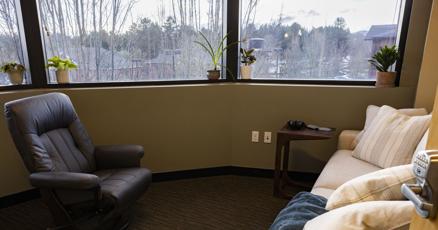Need assistance getting a cannabis business license? Schedule a Free Consultation
The founders of Corvallis’ first psilocybin center said they wanted to create a space that was serene, professional-looking and in alignment with research on the revolutionary effects of psychedelics in the treatment of several mental health disorders, especially treatment-resistant ones.
“So, if you take a pass through other websites, or other facilities coming up, there’s quite a few of them that basically look like psychedelic parks,” said Pieter Bartosh, one of the co-founders of Unstuck. The name comes from from psilocybin’s ability, as with other psychedelics, to reopen the brain’s critical window, making humans more receptive to social learning.
The center, 2211 NW Professional Drive, has the tenor of a wellness or retreat center when you walk in.
The center’s three individual service rooms are painted in warm yellows and oranges and have neutral-colored sofas, throw pillows and blankets. Potted plants adorn floors and windowsills, and on side tables are noise-canceling headphones and eye masks. One room, still being decorated, is reserved for group sessions.
People are also reading…
Adjacent the break room for staff members is where psilocybin products will be stored in a safe location, behind a steel door with an industrial lock as stipulated by the Oregon Health Authority.
Setting up
In 2020, Oregon became the first state to legalize psilocybin use, but it must be for therapeutic purposes under strict supervision in licensed centers.
Federally, psilocybin remains classified as a Schedule I controlled substance, which presents unique challenges for those looking to set up service centers, even in states where the so-called magic mushrooms are legal.
Most potential commercial properties in areas zoned for psilocybin service centers, Bartosh said, often have mortgages with financing plans that do not allow businesses of this nature.
In addition, zoning laws and state directives regarding buffer zones around treatment centers, according to Bartosh, render only two to three locations potentially eligible within Corvallis city limits.
Prior to finding their current spot, co-founder Heather Thomas said she was starting to lose hope.
“It took a lot of work to find this place,” she said.
Unstuck LLC facilitator Heather Thomas expresses what it’s like to watch a client go through treatment and what their visit might consist of depending on client needs.
Part of their success in finding a home for the center was that the building’s owner, a pain care specialist, was researching the effectiveness of psilocybin in pain management compared to opioids. Studies show that, unlike opioids, psilocybin is not addictive.
Obtaining an insurance partner was another challenge.
“The insurance piece has been frankly extremely challenging,” Bartosh said, adding that he believed several service centers may be under-insured because there are very few companies nationwide willing to underwrite businesses in the emerging industry. And when available, the cost is extremely expensive.
Thomas said she’d heard reports of service centers video-taping client sessions to protect themselves because they lack insurance.
It is not a path Unstuck would consider, Thomas said, as client privacy is crucial.
Another hurdle the founders have had to overcome is how to charge for the services. While payment for the facilitation sessions themselves might be processed via card transactions, Bartosh said it was likely clients will have to pay cash for the drug itself.
Currently, Thomas and co-founder Jessica Reich have received their facilitator licenses after undertaking training through a program with an approved Oregon Health Authority curriculum. Each individual training and license cost amounted to about $6,500.
The service center license costs $10,000 per year, but Bartosh’s veteran status reduces the cost by 50%.
The trio also will be hiring other facilitators and workers, who must also obtain a permit from the health authority to work at a licensed service center.
Reich said, despite the cost of training, the state is churning out more facilitators than there are licensed service centers where they can practice. As at Feb 22, the health authority reported 243 approved facilitator licenses and 481 approved worker permits compared to 21 approved service center licenses.
Unstuck LLC co-founders Pieter Bartosh, right, and Jessica Reich discuss the road to opening Corvallis’ first psilocybin treatment center, while standing in the doorway of one of their treatment rooms at their new office.
Eventually, the founders said they plan to open up Unstuck to become a space and avenue for student practica, often the last part of the training program that facilitators must undergo.
The licensing process began last December, according to the founders, and the center is awaiting a final inspection by the health authority in the last week of February before it opens its doors.
At the moment, they are compiling a waitlist online and planning an open house from 2 to 5 p.m. Sunday, March 10.
Prohibitive cost
The expensive start-up costs get factored into what they’ll charge clients.
“Unfortunately, the cost of delivery is somewhat prohibitive at this point,” Bartosh said.
Sessions will run between $1,800 and $2,200, according to the founders. Veterans, first responders, health care workers, firefighters and police officers will receive a 15% discount, Thomas said.
Inside the offices of Unstuck LLC looks like most office buildings. Each of the offices are simple but comfortable rooms equipped with a couch, blankets, and headphones.
Before psilocybin treatment, clients will undergo a pre-session online or in-person so that facilitators can assess their goals, establish which therapeutic touches they would like once under the drug’s influence and give permission to the facilitator to take notes or write in the journals clients are provided with when they arrive.
After the drug is consumed, clients put on an eye mask and headphones — with the option to listen to a curated playlist tailored for the experience — recline and begin their journey. They are encouraged to cry, yell, and feel comfortable in what they’re experiencing.
“We’re here to make sure that they feel safe and feel comforted,” Thomas said.
Per Oregon Health Authority stipulations, clients must remain in the center for four to six hours (if they consume at least 25mg of psilocybin), being closely observed and assisted by a facilitator until the effects begin to wear off.
Once the headphones and masks are off, Thomas and Reich will help their clients process the journey they’ve been on.
“It’s definitely not our job to be their therapist or interpret any of that. It’s to help them figure out what was that journey about,” Thomas said. Within the next 72 hours, however, clients receive a post-session check-in call to ascertain how they are doing.
According to Reich, the trio is working to integrate with other mental health care providers across the city to explore the possibility of coordinated treatment plans for patients.
“It’d be awesome for someone to have a pre-session, like therapy talk session, go through the psilocybin, have a post-session with an actual licensed therapist to really process and dig deep,” Reich said.
Per OHA stipulations, clients cannot drive home themselves after a session, so the founders are also considering offering a transport service if friends or family are not available. Ride-sharing or ride-hailing is not an option they encourage.
Neither do they endorse what Bartosh said is a growing number of people purchasing and consuming large doses of psilocybin at home to take the place of facilitated sessions.
“The research is showing us,” he said, “… to get the benefit, it needs to be in a facilitated context.”
Another danger of this kind of self-administration, Thomas said, is the inability for individuals to know the composition of the psilocybin products they are consuming.
“This is not something I think is safe for people to be doing at home,” she said.
Personal journeys
All three co-founders came to the therapeutic benefits of psilocybin for mental health disorders due to personal traumas and experiences working in the health care industry.
Bartosh has had a long-term ordeal with trauma, he said, both as a result of his upbringing and serving in the military.
Research on psilocybin’s efficacy for those with post-traumatic stress disorder, along with depression and other mental health challenges, has proved promising.
Thomas, an occupational therapist and professor at the Southern California University of Health Sciences, said 20 years of work experience had brought with it a lot of disappointment with the health care system and its approach to therapy.
“But I think the primary reason I’ve gotten into this is because I have seen the extraordinary impact that it’s had on my life,” Thomas said. “I’ve experienced a lot of trauma.”
Reich, a physical therapist, said she, too, was dissatisfied with the health care system’s approach to therapy.
“I feel like, especially with my own experience with psilocybin, it’s just amazing how much it can open up and how therapeutic it can be in conjunction with other things,” Reich said.
Related stories:
Kosisochukwu Ugwuede (she/her) covers the cities of Corvallis, Philomath & Millersburg. She can be reached via e-mail at Kosiso.Ugwuede@lee.net or by phone via 541-812-6091
#lee-rev-content { margin:0 -5px; }
#lee-rev-content h3 {
font-family: inherit!important;
font-weight: 700!important;
border-left: 8px solid var(–lee-blox-link-color);
text-indent: 7px;
font-size: 24px!important;
line-height: 24px;
}
#lee-rev-content .rc-provider {
font-family: inherit!important;
}
#lee-rev-content h4 {
line-height: 24px!important;
font-family: “serif-ds”,Times,”Times New Roman”,serif!important;
margin-top: 10px!important;
}
@media (max-width: 991px) {
#lee-rev-content h3 {
font-size: 18px!important;
line-height: 18px;
}
}
#pu-email-form-business-email-article {
clear: both;
background-color: #fff;
color: #222;
background-position: bottom;
background-repeat: no-repeat;
padding: 15px 0 20px;
margin-bottom: 40px;
border-top: 4px solid rgba(0,0,0,.8);
border-bottom: 1px solid rgba(0,0,0,.2);
display: none;
}
#pu-email-form-business-email-article,
#pu-email-form-business-email-article p {
font-family: -apple-system, BlinkMacSystemFont, “Segoe UI”, Helvetica, Arial, sans-serif, “Apple Color Emoji”, “Segoe UI Emoji”, “Segoe UI Symbol”;
}
#pu-email-form-business-email-article h2 {
font-size: 24px;
margin: 15px 0 5px 0;
font-family: “serif-ds”, Times, “Times New Roman”, serif;
}
#pu-email-form-business-email-article .lead {
margin-bottom: 5px;
}
#pu-email-form-business-email-article .email-desc {
font-size: 16px;
line-height: 20px;
margin-bottom: 5px;
opacity: 0.7;
}
#pu-email-form-business-email-article form {
padding: 10px 30px 5px 30px;
}
#pu-email-form-business-email-article .disclaimer {
opacity: 0.5;
margin-bottom: 0;
line-height: 100%;
}
#pu-email-form-business-email-article .disclaimer a {
color: #222;
text-decoration: underline;
}
#pu-email-form-business-email-article .email-hammer {
border-bottom: 3px solid #222;
opacity: .5;
display: inline-block;
padding: 0 10px 5px 10px;
margin-bottom: -5px;
font-size: 16px;
}
@media (max-width: 991px) {
#pu-email-form-business-email-article form {
padding: 10px 0 5px 0;
}
}
.grecaptcha-badge { visibility: hidden; }




